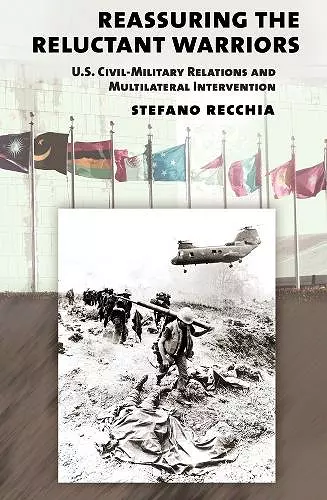Reassuring the Reluctant Warriors
U.S. Civil-Military Relations and Multilateral Intervention
Format:Hardback
Publisher:Cornell University Press
Published:26th Oct '15
Currently unavailable, and unfortunately no date known when it will be back

Why did American leaders work hard to secure multilateral approval from the United Nations or NATO for military interventions in Haiti, the Balkans, and Libya, while making only limited efforts to gain such approval for the 2003 Iraq War? In Reassuring the Reluctant Warriors, Stefano Recchia addresses this important question by drawing on declassified documents and about one hundred interviews with civilian and military leaders.The most assertive, hawkish, and influential civilian leaders, he argues, tend to downplay the costs of intervention, and when confronted with hesitant international partners they often want to bypass multilateral bodies. America's top-level generals, by contrast, are usually "reluctant warriors" who worry that intervention will result in open-ended stabilization missions; consequently, the military craves international burden sharing and values the potential exit ramp for U.S. forces that a handoff to the UN or NATO can provide.Recchia demonstrates that when the military speaks up and clearly expresses its concerns, even strongly pro-intervention civilian leaders can be expected to work hard to secure UN or NATO approval—if only to reassure the military about the likelihood of sustained burden sharing. Conversely, when the military stays silent, as it did in the run-up to the 2003 Iraq War, bellicose civilian leaders are empowered; the United States is then more likely to bypass multilateral bodies, and it may end up carrying a heavy stabilization burden largely by itself. Recchia's argument that the military has the ability to contribute not only to a more prudent but also to a more multilateralist U.S. intervention policy may be counterintuitive, but the evidence is compelling.
"In Reassuring the Reluctant Warriors, Stefano Recchia addresses an important question: Why does the United States pursue multilateral military interventions when it ostensibly has the military capabilities to carry out these interventions on its own? Recchia's original answer to the question is an important contribution to the more general literature on military intervention and U.S. foreign policy in the post–Cold War era. Recchia conducted an impressive number of interviews with many of the key decision makers involved in the post–Cold War interventions about which he writes." -- David M. Edelstein, Georgetown University, author of Occupational Hazards: Success and Failure in Military Occupation
"Like a skilled forensic scientist, Stefano Recchia dissects and refutes the conventional wisdom about how national security decisions are made in the U.S. By doing so, he contributes greatly not only to an understanding of 'How did it happen?' but even more importantly to how to create a mature national security process in the future." -- Gregory S. Newbold, Lieutenant General, USMC, Ret.
"The United States often seeks support from multilateral bodies like the UN Security Council and NATO before launching humanitarian interventions or using military force to change the political institutions of foreign nations. Why? Stefano Recchia in Reassuring the Reluctant Warriors puts forward an original answer to this enduring question. He shows that pro-force civilian policymakers often seek international authorization in order to mollify the government's chief reluctant warriors, for example, the Chairman of the Joint Chiefs of Staff and the service chiefs, who for their part look to such external authorization as insurance that U.S. forces will enjoy foreign burden-sharing and sustained domestic political support. In exploring this subject Recchia is persuasive in presenting his own arguments; he is judicious in his engagement of alternative explanations; and he is rigorous in his deployment of a wide range of cases spanning the entire post-Cold War period. Scholars of international relations and specialists in foreign policy alike will welcome and build upon this book for years to come." -- Joseph M. Grieco, Duke University
"Stefano Recchia has done a masterful job documenting and analyzing the formulation of National Security Policy by the Principals of the National Security Council. His analysis is sound and he provides clear insight into all the arguments for the various courses of action advanced by the Secretary of State, Secretary of Defense, Chairman of the Joint Chiefs and others involved in making recommendations to the Commander-in-Chief." -- Joseph Ralston, General (Ret), USAF, Former Vice Chairman, Joint Chiefs of Staff
ISBN: 9780801452918
Dimensions: unknown
Weight: 907g
296 pages